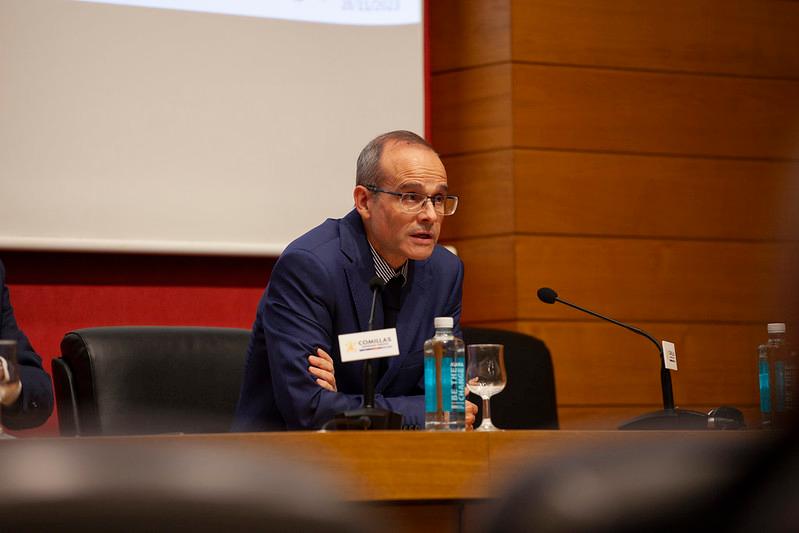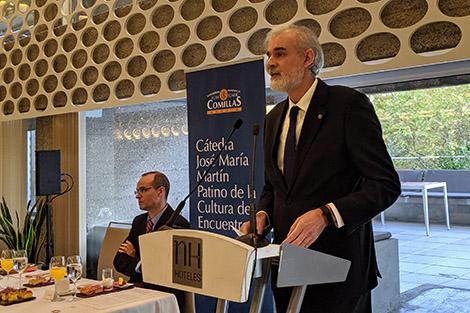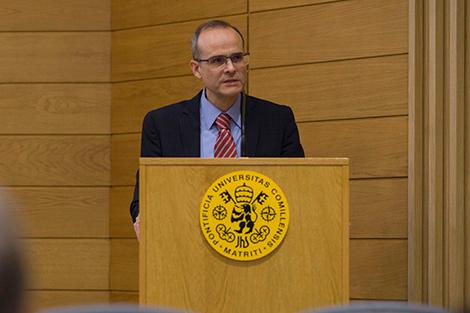Childhood, employment, migration... this is what Spain is like according to the Spain 2024 Report
The José María Martín Patino Chair for a Culture of Encounter presents the 31st edition of this annual work that analyses the socio-economic reality of Spain

28 November 2024
The Comillas Pontifical University and the José María Martín Patino Chair for the Culture of Encounter have presented the Spain 2024 Report, which shows that Spain continues to make progress in a good number of social aspects but that, in others, it needs to improve.
According to Agustín Blanco, Director of the Comillas Chair and coordinator of the report, the work "shows a country characterised by processes of social progress, but with great challenges to face". Among the progress, Blanco highlights the energy communities "as a fundamental factor in the decarbonisation strategy" and highlights the "substantial improvement in the labour market, even though there are issues to face such as digitalisation, temporary employment and the ageing of the population, which are enormous challenges".
The Spain 2024 Report highlights several issues of great importance for Spain in recent months, such as migration. The data show that in 2023 almost 100% more migrants arrived and that in the same year the number of residents in Spain increased by more than 600,000 people.
Yoan Molinero, researcher at the University Institute of Studies on Migration (IUEM) and one of the authors of the chapter on immigration, stresses that "many challenges remain in the migration policy of Spain and the EU that have to do with a fragmented policy that prevents the protection of the human rights of these people and their proper integration into the labour market".
The Spain 2024 Report also addresses the situation of children. The analysis shows that anxiety or depressive disorders have quadrupled in children between the ages of 4 and 14, as have diagnoses of attention deficit and hyperactivity disorder (ADHD): from 2.5% pre-pandemic to 7%.
Salomé Adroher, lecturer in Law at Comillas ICADE and expert in childhood policies, insists that "public policies and a social response are necessary on the part of families, companies, institutions, universities... because we cannot leave children alone". The lecturer insists that the main risk for children, especially those who live in institutions or residences instead of with their families, "is mental health, damaged by the impact of the pandemic and by violence through screens".
The Spain 2024 Report addresses many other issues that reflect the current state of affairs in Spain, such as the employment market, food waste and energy communities, whose challenges are threefold, according to Matteo Troncia, researcher at the Comillas ICAI Institute for Research in Technology (IIT): the regulatory - lack of regulation -, the economic - lack of credit lines to finance the development of these communities - and the technological, due to the lack of digital tools to manage the shared use of energy".
Antonio Allende, SJ, Rector of Comillas, underlined the importance of the report and congratulated the José María Martín Patino Chair for a Culture of Encounter for this 31st edition. "The Spain Report provides analysis and arguments to promote a social, media and political debate on major issues, providing interdisciplinary knowledge and information in collaboration with other universities and other prominent authors from civil society," said the Rector.
More info
You may also be interested in

Educación, estado de la democracia, inteligencia artificial y del Estado del bienestar o la inteligencia artificial, entre los temas analizados en el informe

Pobreza energética, acoso sexual, envejecimiento, industria 4.0 o populismos, entre los temas analizados

El Informe España revela que la sociedad cambia más deprisa debido a los cambios provocados por la COVID-19
